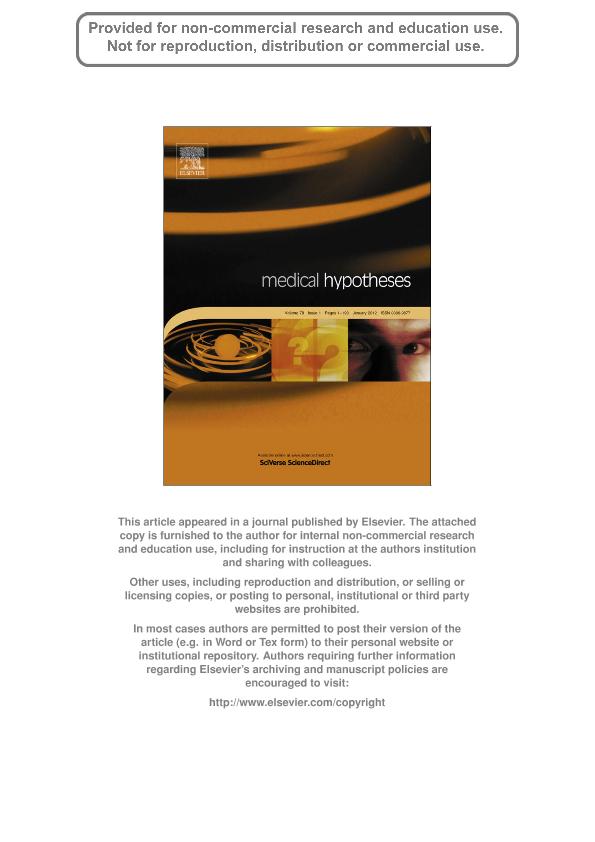Mostrar el registro sencillo del ítem
dc.contributor.author
Strejilevich, Sergio

dc.contributor.author
Teitelbaum, J.
dc.contributor.author
Martino, Diego Javier

dc.contributor.author
Quiroz, D.
dc.contributor.author
Kapczinski, F.
dc.date.available
2023-04-19T12:47:25Z
dc.date.issued
2012-01
dc.identifier.citation
Strejilevich, Sergio; Teitelbaum, J.; Martino, Diego Javier; Quiroz, D.; Kapczinski, F.; Dopamine sudden depletion as a model for mixed depression; Churchill Livingstone; Medical Hypotheses; 78; 1; 1-2012; 107-112
dc.identifier.issn
0306-9877
dc.identifier.uri
http://hdl.handle.net/11336/194496
dc.description.abstract
Up to date research on Bipolar Disorders' phenomenology is in keeping with early descriptions made by E. Kraëpelin regarding the overlap in clinical presentation of both manic and depressive symptoms, namely, mixed states. The latter constitute a highly prevalent and characteristic clinical presentation of Bipolar Disorders' and entail therapeutic difficulties, prognostic implications and increased suicidal risk. Notwithstanding, mixed states', more specifically mixed depression, have been underestimated and bypassed to the point where currently neither diagnostic criteria nor specific therapeutic recommendations are provided. In addition to the lack of agreement on nosography and diagnostic criteria, mixed depression is usually excluded from Bipolar Disorders' neurobiological models. Furthermore, renewed interest in the role of dopamine in Bipolar Disorders' physiopathology has left aside hypothesis that may account for the aforementioned clinical presentation. Interestingly enough, other syndromes arising from sudden dopamine depletion such as neuroleptic dysphoria or withdrawal syndromes from dopaminergic drugs, bear remarkable clinical similarities with mixed depression. These syndromes have been subject of further research and may thus provide a model for mixed states' physiopathology.Indeed, this article accounts for clinical similarities between mixed depression, neuroleptic induced dysphoria, and other behavioural syndromes arising from sudden dopamine depletion. After reviewing neurochemical basis of such syndromes we present, to the best of our knowledge, the first neurobiological hypothesis for mixed depression. Specifically, such hypothesis regards over activation symptoms as auto regulatory attempts to compensate for sudden dopaminergic depletion. This hypothesis provides with a beginning step for the neglected problem of mixed depression, a non-antithetic link between the dopaminergic hypothesis for both manic and depressive symptoms, a plausible explanation regarding inter individual variability to mixed depression susceptibility, and suggests new approaches for the development of novel treatments in which dopamine dysregulation should be targeted.
dc.format
application/pdf
dc.language.iso
eng
dc.publisher
Churchill Livingstone

dc.rights
info:eu-repo/semantics/openAccess
dc.rights.uri
https://creativecommons.org/licenses/by-nc-sa/2.5/ar/
dc.subject
bipolar disorder
dc.subject
mixed depression
dc.subject
dopamine
dc.subject.classification
Psiquiatría

dc.subject.classification
Medicina Clínica

dc.subject.classification
CIENCIAS MÉDICAS Y DE LA SALUD

dc.title
Dopamine sudden depletion as a model for mixed depression
dc.type
info:eu-repo/semantics/article
dc.type
info:ar-repo/semantics/artículo
dc.type
info:eu-repo/semantics/publishedVersion
dc.date.updated
2023-04-18T13:12:50Z
dc.journal.volume
78
dc.journal.number
1
dc.journal.pagination
107-112
dc.journal.pais
Estados Unidos

dc.description.fil
Fil: Strejilevich, Sergio. Consejo Nacional de Investigaciones Científicas y Técnicas; Argentina. Universidad Favaloro. Facultad de Medicina. Instituto de Neurociencias; Argentina
dc.description.fil
Fil: Teitelbaum, J.. Instituto de Neurología Cognitiva; Argentina
dc.description.fil
Fil: Martino, Diego Javier. Universidad Favaloro. Facultad de Medicina. Instituto de Neurociencias; Argentina. Consejo Nacional de Investigaciones Científicas y Técnicas; Argentina
dc.description.fil
Fil: Quiroz, D.. Universidad Favaloro. Facultad de Medicina. Instituto de Neurociencias; Argentina
dc.description.fil
Fil: Kapczinski, F.. No especifíca;
dc.journal.title
Medical Hypotheses

dc.relation.alternativeid
info:eu-repo/semantics/altIdentifier/url/https://www.sciencedirect.com/science/article/pii/S0306987711005172
dc.relation.alternativeid
info:eu-repo/semantics/altIdentifier/doi/http://dx.doi.org/10.1016/j.mehy.2011.10.004
Archivos asociados
